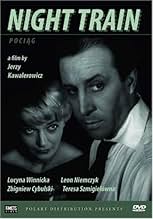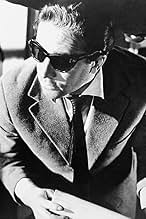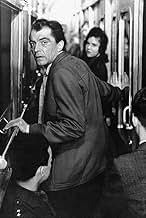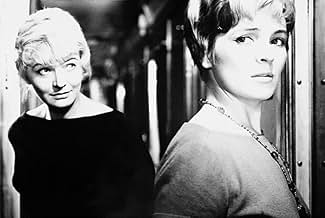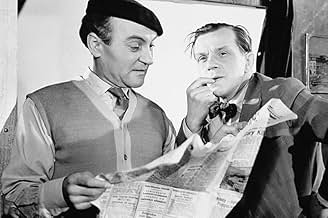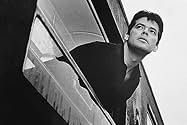NOTE IMDb
7,7/10
3,9 k
MA NOTE
Ajouter une intrigue dans votre langueJerzy enters a train set for the Baltic coast. He seems to be on the run from something, as does the strange woman with whom he must share a sleeping compartment.Jerzy enters a train set for the Baltic coast. He seems to be on the run from something, as does the strange woman with whom he must share a sleeping compartment.Jerzy enters a train set for the Baltic coast. He seems to be on the run from something, as does the strange woman with whom he must share a sleeping compartment.
- Réalisation
- Scénario
- Casting principal
- Récompenses
- 2 victoires et 1 nomination au total
Andrzej Herder
- Sailor
- (non crédité)
Barbara Horawianka
- Jerzy's Wife
- (non crédité)
Avis à la une
10gombro
The film beautifully depicts the reality of trains, possibly not only those running in Poland but also all over the world. The claustrophobic atmosphere of the train brings people together and lets the viewers plunge into the story and its rhythm. Beautiful black and white pictures and melancholic jazz theme bring to mind other films form the era. What makes the film even more attractive is the final turning point and sudden change in the behavior of the passengers. The only regretful fact is that such intimate,subtle films are not made anymore. Great pity.If it was made in English by lets say Orson Welles it would have been a cult movie for sure all over the world just as it is in Poland.
It is marvellous that this magnificent Polish classic has been made available in 2011 in a restored version on DVD with English subtitles. The film, in crisp black and white with extremely creative camera work, is a joy to watch. In many ways it resembles the Western noir films of the late forties and early fifties, but it has psychological depth and is not just a thriller. In many ways it reminds me of a high-quality noir such as Nicholas Ray's IN A LONELY PLACE (1950, see my review), where loneliness and tragic encounters are really the main theme. That film's theme was 'I loved you for a few weeks', but in this film the love lasts for but a day. NIGHT TRAIN (POCIAG in Polish, which merely means 'train', though in an earlier release for the cinema, the film was known in English as BALTIC EXPRESS) takes place mostly on a train, and train films are always such a great favourite, being a perfect metaphor of life. This aspect is intensively stressed by the director, with his shots of the many separate carriages and compartments, both full and later empty. The moving shots up and down the crowded corridors seem to be a miracle of planning, and give every appearance of having been shot on a real moving train. But some of it was done in a studio with removable walls, to enable this seemingly impossible camera movement to take place. The camera never stops, it roams restlessly like a wild beast through this moving Noah's ark of humanity, seething as it is with mystery, fear, an escaping murderer, a woman with murder in her heart, a despairing wife trapped in a hopeless marriage, and even a survivor of Buchenwald who cannot sleep in a bunk because it reminds him of the concentration camp, so that he spends all his time in the corridor reading, until he drops off. They are all supposed to be going off on holiday to the seaside, a town called Hel. The dramas meanwhile are swirling round everyone as they tensely smoke their cigarettes and fret about the dangers of a killer in their midst, and make furtive assignations. The train stops at night at a place where it has never stopped before, and three policemen get on, in search of the man who has just murdered his wife. Which of the mysterious men on the train is really the murderer? The astonishing scene where the murderer leaps from the moving train and all the men go after him in a mob scene and trap him in a ramshackle cemetery is meant to be a metaphor for the seamy side of Poland's recent history. The Polish government had banned jazz music until the reforms of 1956, so this film has a defiantly jazz soundtrack all the way throughout, though soft, dreamy, and haunting. The atmosphere of the film is electric but also mesmerizing. There are long periods of brooding and contemplation, and many characters barely speak, while others chatter uncontrollably. The focus of the film is on the mysterious blonde beauty, played by Lucyna Winnicka, who says little, and after this film was shot, married the director. She conveys so much by her eyes and expressions and moods that there is little need for dialogue. The film was directed by Jerzy Kawalerowicz (1922-2007), who made 17 films between 1952 and 2001, of which this, PHARAOH (1966), QUO VADIS? (2001), and MOTHER JOAN OF THE ANGELS (1961) are the most famous. In NIGHT TRAIN, he shows himself to be a master of the cinematic craft. The film is continuously absorbing, thoughtful but paced, and deeply intriguing. Like life, it does not answer all of its mysteries, and happiness remains elusive. One of the most frustrated and disappointed of the characters is played by the famous actor, Zybigniew Cybulski, as an eager young man who simply cannot comprehend his rejection by Winnicka, or even begin to understand her new and impenetrable air of gloom and inevitable fate. When fate takes an unexpected turn, the defeat of inevitability itself has the taste of exchanging one emptiness for another. Empty compartments, empty lives; a speeding train, life's hurtling express in which we all are carried. This is one of the finest of the many 'train films'.
Although it has superficial similarities with Hitchcock films (it's in black and white; it takes place on a train; it's a murder mystery; there are plenty of red herrings and misleading clues), I loved this moody Polish film because it is visually stunning and refreshingly free of Hollywood clichés. I saw a lot of Expressionist influence in the artfully planned staging and unusual camera angles, both inside the cramped railway corridors and outside the train in various stops along the route. The film is fairly demanding on the viewer: there are a lot of secondary characters with complicated stories of their own, and I found myself repeatedly pausing the DVD to catch details that I had missed. The final scenes were intricately choreographed and highly stylized, reminiscent of black-and-white-era Fellini. Not for everyone, but I found it delightful and plan to watch it again.
This is definitely one of the greatest, and at the same time, one of the most under-appreciated movies in the history of Polish cinema. Jerzy Kawalerowicz is a true master craftsman in the country's film world, and with Night Train he once again proved that this statement is perfectly true. It's a shame that the movie is sometimes cruelly omitted when talking about fine post-war cinema, because it is certainly worth a watch.
Night Train is different from other various Polish movies that came out in the 50's and later, as it doesn't present the social problems that the country had to fight with during the difficult period of Communism.
It reminds me of the movies directed by the Master of Suspense, Sir Alfred Hitchcock, as it contains the recurring themes of murder, suspenseful mystery, the wrongly accused man and a search for the real criminal.
It also reminds me of the great noir movies produced in the United States or Italy throughout the 20th century. It possesses a deeply sombre tone and claustrophobic ambiance created by the particular scenery, in which it takes place - a train. All of this is complemented with an eerie music playing in the background.
Aboard the train, which goes from Lodz to the seaside in Poland, there are many unusual, strangely mysterious, and overly suspicious passengers. One of them is Jerzy, the main character, played brilliantly by Leon Niemczyk. Strolling around in his classy dark glasses he seems like he needs to hide from something or someone. Unfortunately, due to some peculiar circumstances, he has to share the sleeping cabin with a pretty lady, Marta. However, as time passes by, the two are starting to have a connection, because of the seemingly similar life experiences and peculiar interests.
In the neighboring compartment we can find an unnamed man with his nosy wife, who quickly starts to flirt with distracted Jerzy. She looks so unhappily married that she resolves to flirting with almost all of the co-travelers.
Then there is also Staszek, the boy, who is deeply in love with Marta, but, due to some unmentioned previous occurrences, she doesn't want to be with him any more.
All those characters' affairs intertwine at various points in the storyline. Great and clever dialogues accompany every scene. And in the middle of it all there is the tranquil search for the murderer. However, as important as it may seem sometimes, it isn't actually the main topic of Night Train.
The hunt for the killer occurs in the climax of the movie, when an angry mob runs through the train cars and into the woods to finally catch him. What happens next – the public execution (however not deadly) reminded me of the great western The Ox-Bow Incident. The will of the majority always wins, no matter if someone is legally found guilty or not.
The final scene beautifully reflects what had happened on that night - the compartments are empty, and look somehow pure, but the scattered belongings and open windows give the sequence an obscure touch.
All in all, Night Train is truly a fantastic Polish movie with many suspenseful twists, romance and a huge emphasis put on various characters' personalities, in order to show that anonymity is omnipresent and everyone can almost hide in its shadow if he wants to.
Night Train is different from other various Polish movies that came out in the 50's and later, as it doesn't present the social problems that the country had to fight with during the difficult period of Communism.
It reminds me of the movies directed by the Master of Suspense, Sir Alfred Hitchcock, as it contains the recurring themes of murder, suspenseful mystery, the wrongly accused man and a search for the real criminal.
It also reminds me of the great noir movies produced in the United States or Italy throughout the 20th century. It possesses a deeply sombre tone and claustrophobic ambiance created by the particular scenery, in which it takes place - a train. All of this is complemented with an eerie music playing in the background.
Aboard the train, which goes from Lodz to the seaside in Poland, there are many unusual, strangely mysterious, and overly suspicious passengers. One of them is Jerzy, the main character, played brilliantly by Leon Niemczyk. Strolling around in his classy dark glasses he seems like he needs to hide from something or someone. Unfortunately, due to some peculiar circumstances, he has to share the sleeping cabin with a pretty lady, Marta. However, as time passes by, the two are starting to have a connection, because of the seemingly similar life experiences and peculiar interests.
In the neighboring compartment we can find an unnamed man with his nosy wife, who quickly starts to flirt with distracted Jerzy. She looks so unhappily married that she resolves to flirting with almost all of the co-travelers.
Then there is also Staszek, the boy, who is deeply in love with Marta, but, due to some unmentioned previous occurrences, she doesn't want to be with him any more.
All those characters' affairs intertwine at various points in the storyline. Great and clever dialogues accompany every scene. And in the middle of it all there is the tranquil search for the murderer. However, as important as it may seem sometimes, it isn't actually the main topic of Night Train.
The hunt for the killer occurs in the climax of the movie, when an angry mob runs through the train cars and into the woods to finally catch him. What happens next – the public execution (however not deadly) reminded me of the great western The Ox-Bow Incident. The will of the majority always wins, no matter if someone is legally found guilty or not.
The final scene beautifully reflects what had happened on that night - the compartments are empty, and look somehow pure, but the scattered belongings and open windows give the sequence an obscure touch.
All in all, Night Train is truly a fantastic Polish movie with many suspenseful twists, romance and a huge emphasis put on various characters' personalities, in order to show that anonymity is omnipresent and everyone can almost hide in its shadow if he wants to.
A man named Jerzy (Leon Niemczyk) is taking a Night Train along the Baltic coast, he wears dark sunglasses and by his body language we can tell he wants to be alone and to this end, he books a sleeping compartment all to himself, .But on entering his compartment he finds a young blonde woman named Marta (Lucyna Winnicka) occupying it, she refuses to leave even when the train inspector is called, but when the inspector threatens her with the police, Jerzy says forget about it and he lets her stay, suspicious behaviour as the very overcrowded train is awash with talk of the local murderer who is on the run from the police, Marta also seems to have something to hide and is being chased by a young suitor travelling in standard classic, in a train full of different character, could the killer be on board?Jerzy calls a truce with Marta and soon their conversation begins to open up, a bond gradually grows between the two but is interrupted when the police hunting for the killer, board the train in a remote area and immediately arrest Jerzy, can he prove his innocence on the remaining journey? Jerzy Kawalerowicz perhaps best known as the director of the superb tale of possession, Matka Joanna od aniolów (1961) here produces a Hitchcockian type thriller set on a train with equally successful results. Set to a jazzy score Andrzej Trzaskowski, which adds immensely to the atmosphere while also perfectly suiting the motion of the train, we are gradually introduced to many of the different characters on board, a large group on a pilgrimage, the desperately flirtatious wife of a Polish solicitor, intent on getting some attention from whoever will listen, the young priest travelling with his elderly Monsiegnor, we even get to know the train staff intimately. Jan Laskowski's cinematography is beautiful and captures the claustrophobia of the overcrowded train, but yet still retains a sense of movement in a confined space. The killer being chased at dawn across cold open fields by all on board is a highlight, it finishes with the killer's capture in a rundown graveyard. The films ending is quite apt and somewhat downbeat as all the travellers return to their own lives at their destination, after the excitement of the previous night.
Le saviez-vous
- AnecdotesStaszek, the young man following Marta, is seen several times getting on the train after it has started moving. The inspector warns him a couple of times that it is dangerous. Zbigniew Cybulski who plays Staszek died a few years later, aged 39, after falling under a moving train he was attempting to board at Wroclaw Glowny railway station in Poland.
- ConnexionsFeatured in Fejezetek a film történetéböl: A lengyel film (1990)
Meilleurs choix
Connectez-vous pour évaluer et suivre la liste de favoris afin de recevoir des recommandations personnalisées
- How long is Night Train?Alimenté par Alexa
Détails
- Durée1 heure 39 minutes
- Couleur
- Mixage
- Rapport de forme
- 1.37 : 1
Contribuer à cette page
Suggérer une modification ou ajouter du contenu manquant

Lacune principale
By what name was Train de nuit (1959) officially released in India in English?
Répondre
